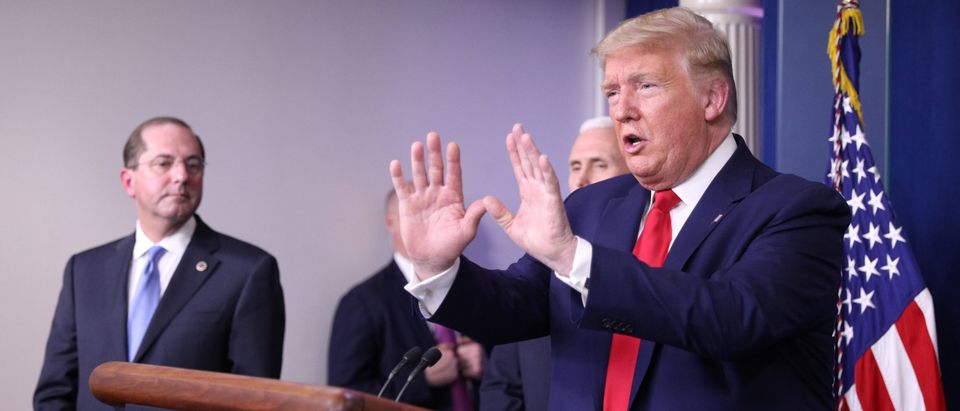It took an act of political courage for President Trump to shut down the country and take the hit to our economy in order to combat the Wuhan virus. Soon it will take an even more courageous act for him to put America back to work.
The United States has responded in unprecedented fashion to the pandemic, with statewide lockdowns, business closures, social distancing practices and stay-at-home orders. The federal government has been placed on a war footing to mitigate the effects of COVID-19.
Thankfully, the rate of increase of new cases has declined in many hotspots, including New York City, which expects to see peak new case numbers this week. Current estimates show that the country as a whole will pass the peak next week.
However, the economy has taken the worst hit since the Great Depression, maybe the worst ever. Unemployment has soared, GDP is cratering, and the stock market, while stabilizing, is down 20 percent from its historic highs in February.
The question is, how long can the United States put economic activity on hold before the temporary crash becomes permanent? The prevailing belief is that since the fundamentals were good before the pandemic, things will quickly snap back once restrictions are lifted. This is not an economic problem, it’s a biological problem with economic consequences. The consensus belief is that a $2.2 trillion stimulus will hopefully stem enough of the bleeding to get through the hard times.
This may be wishful thinking. Radical deficit spending may calm markets and reduce panic, but it cannot replace productive market activity. And the small businesses that have borne the brunt of the closures cannot hold on indefinitely. Holding 320 million Americans under near-house arrest until public health officials “feel comfortable” with their statistics is most definitely not the answer.
The press and social media undoubtedly made public anxiety worse than it might have been. The difference between this outbreak and the similarly pervasive and deadly H1N1 pandemic of 2009-2010 may come down to the fact that Facebook and Twitter were less influential a decade ago. The most viral pathogen has been the fear the media have forced into the public consciousness.
The curse of the Information Age is the near-instantaneous broadcast transmission of minutiae out of context. Consumers take anecdotal, localized snapshot information and are psychologically conditioned to apply it to their own lives and circumstances, even if the polar opposite is true in their individual case. We are building, nourishing, constantly grooming and feeding fear. It is changing the character of the country. If the Pilgrims’ first winter or the Normandy landings on D-Day were 24/7 live-streamed with highly speculative “expert” commentary, America would not exist. Fear would not allow it.
So far, the public policy balance has been weighed completely towards dealing with health consequences. New York Governor Andrew Cuomo epitomized this approach when he said the sacrifices being made in his state are worth it even if they save “just one life.”
That is an inspiring sentiment, but totally irresponsible public policy. When jobs begin to disappear for good, when people lack money to pay the rent and buy food, when the supply chains start to break down, and when social unrest takes hold, what then? Do we save just one life by sacrificing our way of life? People will contract this disease. It is a tragic fact. However, the threat from this malady is nowhere near what it was supposed to have been. In the early days of its spread information was sketchy and models such as the now infamous Imperial College projection predicted transmission and death rates far in excess of what we have actually seen.
At some point, and soon, the United States will require courage. We must return to work and “normalcy.” Reducing near-house arrest controls may lead to a temporary bump in the rates of infection as herd immunity tries to take hold. President Trump’s critics will gleefully rush to declare failure.
Nevertheless, the president needs to make the decision to put America back to work. Using the types of precautions that are in effect in Sweden we can get about 85% of the country back on track. Sweden has opted only for social distancing measures, protecting vulnerable populations, and emphasis on thorough handwashing.
We can’t allow the mere idea of the possibility of something unfortunate happening paralyze our entire country and condemn our future.
To save our country, we need courage. We need to decide to be America. America is worth it.
Chris Farrell is director of investigations and research at Judicial Watch, a nonprofit government watchdog. He was previously a military intelligence officer.


